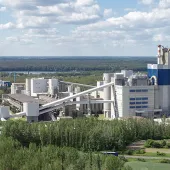Shell Bitumen CarbonSink used in France for first time

New biogenic component binder locks carbon within roads to help decarbonize construction
SHELL Bitumen CarbonSink, Shell’s new bio-component binder that locks carbon within roads instead of releasing it back into the atmosphere, has been used in France for the first time.
Karp-Kneip Constructions led the project, where 20 tonnes of Shell Bitumen CarbonSink was used in the construction of a car park at Brumath Enrobés’s asphalt production plant in Bas-Rhin, Alsace. The asphalt for the project was laid by civil construction company Trabet.
Shell Bitumen CarbonSink contains a new bio-component binder that locks carbon into asphalt and bitumen, turning the road into a technical carbon sink. High levels of asphalt recycling around the world ensure carbon remains locked in the binder, even when it is recycled and re-used in the manufacture of new asphalts or other civil engineering applications.
‘The decarbonization of the construction industry is a challenge that will require effort from each part of the value chain, and this project is a great example of that type of cross-sector collaboration,’ said Ana Alvernhe, general manager for Europe at Shell Construction and Road.
‘At Shell, we want to use our experience in the energy industry to deliver innovations that can support our customers’ net-zero ambitions – so it is fantastic to see Shell Bitumen CarbonSink used for the first time in France, helping to drive the decarbonization of construction in another important market.’
The technical carbon sink created by Shell Bitumen CarbonSink locks in up to 250kg of CO2 equivalent into each tonne of bitumen and up to 13kg of CO2 equivalent* in each tonne of asphalt. This means up to six tonnes of CO2 equivalent can be locked in per kilometre of road.**
Shell Bitumen CarbonSink, which has already been deployed in the UK by Aggregate Industries for its SuperLow-Carbon asphalt, is being launched in multiple markets to be used at scale across the global road network.
*Shell Bitumen CarbonSink locks in up to 250kg carbon dioxide equivalent per tonne of bitumen based on the biogenic carbon component used and on 5% binder content within the asphalt mixture
**Based on a model single surface layer 50mm deep, 3.5m wide, and 5% binder content









